

GetDoc. Aviation industry reiterates need for EU drone laws – EurActiv.com. The European Cockpit Association (ECA) has called on the EU to step up its efforts in introducing a safety framework for drones and to set up a mandatory register.

EurActiv Spain reports. In a joint statement, the aviation industry urged Brussels to establish a “robust harmonised EU-wide regulatory safety framework for drones”. The signatories included airline pilots, helicopter operators and air-traffic controllers. They also insisted that a mandatory register would facilitate the tracking down of non-compliant owners and machinery when safety guidelines are breached. The ECA also proposed mandatory courses in piloting the devices and a licence for certified operators, depending on what the drones will ultimately be used for. The association also urged EU lawmakers to establish limits on where drones can be used and the altitude at which they can be operated. Regulation of Drones: European Union. Back to Regulation of Drones Summary Currently, the European Union (EU) does not regulate the civilian use of remotely piloted aircraft (RPA) with a mass of 150 kg or less.
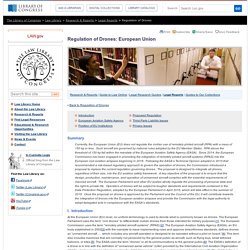
Such aircraft are governed by national rules adopted by the EU Member States. RPA above the threshold of 150 kg fall within the mandate of the European Aviation Safety Agency (EASA). Since 2014, the European Commission has been engaged in promoting the integration of remotely piloted aircraft systems (RPAS) into the European civil aviation airspace beginning in 2016. I. At the European Union (EU) level, no uniform terminology is used to denote what is commonly known as drones. The EU does not regulate drones whose mass is 150 kg or less, because the current governing regulation, Regulation 216/2008 on Common Rules in the Field of Civil Aviation, only covers aircraft whose mass is above that size.[10] Such large drones fall within the competence of the EASA.
Back to Top II. III. IV. European Commission Finds Existing Technology Neutral Regulations Adequate For Drone Privacy. GetDoc. ENISA - En français. ENISA –Sécuriser la société de l'information en Europe Compte tenu de leur rôle essentiel dans nos sociétés et nos économies modernes, les ordinateurs, les téléphones portables, les banques et l'internet doivent fonctionner ensemble correctement.
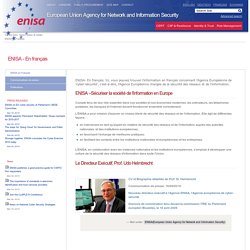
L'ENISA a pour mission d'assurer un niveau élevé de sécurité des réseaux et de l'information. Elle agit de différentes façons: en intervenant en tant qu'expert en matière de sécurité des réseaux et de l'information auprès des autorités nationales et des institutions européennes;en favorisant l’échange de meilleures pratiques;en facilitant les contacts entre les institutions (nationales et européennes) et les entreprises. L'ENISA, en collaboration avec les instances nationales et les institutions européennes, s’emploie à développer une culture de la sécurité des réseaux d'information dans toute l'Union.
Le Directeur Exécutif, Prof. CELEX%3A32015L1535%3AFR%3ATXT. CELEX%3A32016L1148%3AFR%3ATXT. CELEX%3A32015L1535%3AFR%3ATXT. Directive NIS : enjeux pour les OSE (OIV en France) La transposition de la directive NIS entrée en vigueur le 19 juillet 2016, doit intervenir au plus tard le 9 mai 2018.
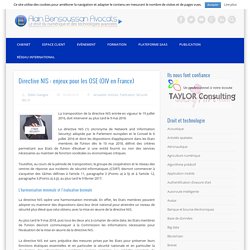
La directive NIS (1) (Acronyme de Network and Information Security) adoptée par le Parlement européen et le Conseil le 6 juillet 2016 et dont les dispositions d’appliqueront dans les Etats membres de l’Union dès le 10 mai 2018, définit des critères permettant aux Etats de l’Union d’évaluer si une entité fournit ou non des services nécessaires au maintien de fonction sociétales ou économiques critiques. A European Perspective on Robot Law-An interview with Ms. Mady Delvaux-Stehres – Tech and Law Center. 10 years after the release of EURON Roboethics Roadmap, the world has been faced a critical technology revolution.

We continuously witnessed Google’s self-driving car, Amazon’s KIVA system, drones, SoftBank’s Pepper, Boston Dynamics’ Atlas, ROSS System, and AlphaGO coming into our lives. Artificial Intelligence (AI) is no more a science fiction concept, but the next wave to change our society. More interestingly, the intersection of AI & law will not only affect how people think, but also what people do in their daily life, how they behave. For this interview, we would like to invite Ms. Mady Delvaux-Stehres to share her insights on the European perspective on Robot Law. Interviewee: Ms. Interviewer: Dr. Date: July 13th 2016 WENG:Thank you for agreeing to an interview. DELVAUX-STEHRES:I am not a scientist, but I am fascinated by new technologies and their implications for our daily life.
DELVAUX-STEHRES:The Robolaw research project was funded by the European Commission. IPOL IDA(2015)519221 EN. Documents. Language of document : ECLI:EU:C:2014:2428 JUDGMENT OF THE COURT (Fourth Chamber) (Reference for a preliminary ruling — Directive 95/46/EC — Protection of individuals — Processing of personal data — Concept of ‘in the course of a purely personal or household activity’) In Case C‑212/13, REQUEST for a preliminary ruling under Article 267 TFEU from the Nejvyšší správní soud (Czech Republic), made by decision of 20 March 2013, received at the Court on 19 April 2013, in the proceedings František Ryneš v Úřad pro ochranu osobních údajů, THE COURT (Fourth Chamber),
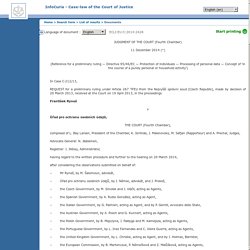
EU court ruling means civilian use of drones in public must comply with data protection laws. The Court of Justice of the EU (CJEU) on Thursday ruled that "video surveillance" by individuals that is carried out "even partially" in a public space is subject to the EU's Data Protection Directive, even if the camera capturing images of people is "directed outwards from the private setting of the person processing the data".
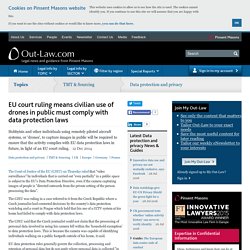
The CJEU was ruling in a case referred to it from the Czech Republic where a Czech journalist had contested decisions by the country's data protection watchdog and a court in Prague which held that his use of a CCTV system at his home had failed to comply with data protection laws. The CJEU said that the Czech journalist could not claim that the processing of personal data involved in using his camera fell within the 'household exemption' to data protection laws. This is because the camera was capable of identifying individuals walking on a public footpath outside of his home, it said.